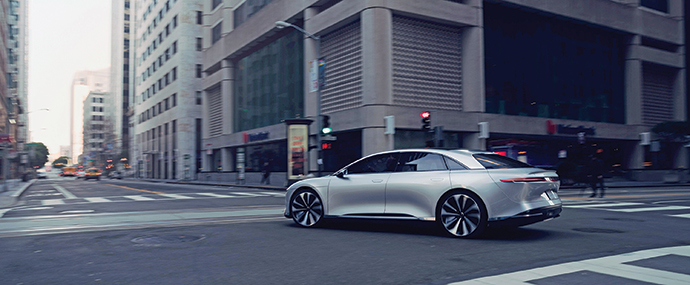Within the next two years, the world will greet an intriguing rival to the luxury electric auto giant, Tesla. Lucid Motors, formerly known as Atieva, announced in late 2016 that it will begin building luxury electrics at a new auto assembly plant in Casa Grande, Arizona, a Phoenix suburb. Lucid scouted more than 60 markets in 13 states before settling on Casa Grande.
The startup automaker, located in Menlo Park, California, officially selected Casa Grande at a ceremony in November, saying its $700 million factory on a 500-acre site between Phoenix and Tucson will employ 2,000 workers by 2022.
Lucid says its first models will roll off the assembly line in 2019, with plans to assemble 10,000 vehicles within the first year of operation and 130,000 units annually by 2022.
The “Tesla Killer”
A prototype of Lucid’s initial offering, the Air, known in some circles as “the Tesla Killer,” is smaller than the popular Tesla Model S, but features a roomier, more luxurious interior heavy on high-tech features and a spacious windshield that extends beyond the traditional roof line.
With the equivalent of 400 horsepower, rear-wheel drive, and the hardware necessary for eventual autonomous driving, the base version of the Lucid Air is aimed to be priced at $52,000. The car will have a range of 240 miles on a single charge.
In a written statement, Peter Rawlinson, Lucid’s chief technology officer, said “Lucid Motors is building the luxury automobile of the future, and we have an opportunity to become the global leader in automotive technology. We are confident,” said Rawlinson, “that Arizona is the ideal location to advance our innovations and will provide an excellent platform for our success.”
Arizona, which is now in the Top 5 for tech enterprises nationwide, has been an early supporter of disruptive technologies through an open regulatory framework and aggressive incentives that require companies to perform to obtain the benefits.
Lower Taxes, Lighter Regulations
Arizona Governor Doug Ducey noted Lucid’s broad search for a manufacturing base in noting that the Phoenix region has quietly become one of the hottest new hubs for testing and developing electric and self-driving cars. In December, Ducey took the initial test ride in one of 16 Uber self-driving autonomous cars that had abruptly been trucked to Arizona from California, after Uber refused to apply for special test licenses required by the state for self-driving cars.
“(The permits) were expensive. That, plus the liability coverages that were required in California, made it a challenge to do the testing needed.
“We’ve been able to expedite expensive that plus the liability coverages that were required in California. They made it a challenge there to do the testing that they needed.
“We’ve been able to expedite the process,” says Camacho, “which allows these companies to go to market and test expeditiously. Our conversations were about speed to market. Any new market opportunity that exists, you have to be one of the leaders of it.”
Gov. Ducey credits lighter regulations and lower taxes as among the state’s strengths in luring technology-focused automakers.
“We’ve demonstrated that Arizona is among the most competitive states in the nation to work and do business,” says Ducey.
While self-driving vehicles remain in the testing stage, in Arizona they are treated like any other car on the road. Nor will Arizona require Uber or others to report crashes or other information to the state, which requires only minimum liability insurance policies for self-driving vehicles.
In addition to Uber, Google is testing self-driving car technology in the Phoenix suburb of Chandler. Cruise Automation, bought by General Motors Corp. and Waymo, also are among other autonomous vehicle- makers conducting tests in the area.

